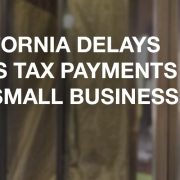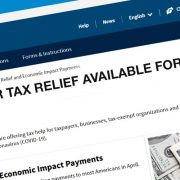https://cannabistaxattorney.com/how-some-cbd-companies-are-getting-millions-in-federal-aid-through-a-loophole-in-the-cares-act/
On March 27, 2020 President Trump signed the $2 trillion Stimulus Bill formally known as the Coronavirus Aid, Relief and Economic Security [CARES] Act (the “CARES Act”) to provide assistance to workplaces and employees. The CARES Act provides many benefits intended to deliver cash into the hands of individuals and businesses, as well as many other tax provisions … but if you are in the cannabis business, you need to look elsewhere for relief.
CARES Act Relief For Businesses
The CARES Act offers the following two major “stimulus” provisions for businesses: the Employee Retention Credit and the Paycheck Participation Program.
Employee Retention Credit
Eligible employers are allowed a credit against employment taxes for each calendar quarter equal to 50% of qualified wage (including health benefits) paid to employees. This amount is limited to $10,000 of wages paid to an employee for all calendar quarters.
An eligible employer is one which is in a trade or business:
- Whose operation is fully or partially suspended due to orders from an appropriate governmental authority limiting commerce, travel or group meetings due to COVID-19; or
- Who has a “significant decline” in gross receipts (i.e., there is a decrease to less than 50% of the gross receipts for the same quarter in the prior year).
Different rules apply as to the covered wages depending upon the number of employees the employer had in 2019. Tax exempt entities are also able to take advantage of this credit. However, this credit is not available to employers receiving a Small Business Interruption Loan under section 1102 of the Act or if a Work Opportunity Tax Credit is allowed for the employee.
Unfortunately, this credit is not be available for state-licensed cannabis businesses as cannabis is a Schedule I controlled substance under Federal law.
Paycheck Participation Program (“PPP”)
Under this program, small businesses with 500 or fewer employees including not-for-profits, veterans’ organizations, tribal concerns, self-employed individuals, sole proprietorships, and independent contractors are eligible for loans to pay up to eight weeks of payroll costs including benefits as well as other costs.
PPP funds can be used to pay payroll costs including benefits (with salaries being under $100,000 per employee), interest on mortgages, rent payments, and utility bills; however, no more than 25% of the funds can be used for non-payroll costs.
The loan of the PPP funds will be forgiven if you maintain your pre-existing employees at their pre-existing salary levels. Also, that you do not pay out more than 25% of the PPP funds for non-payroll costs specifically limited to: interest on mortgages, rent, and utilities.
The application can be found here on the United States Treasury website, along with details for borrowers and lenders. After completing the application you would then go to any existing SBA lender or through any federally insured depository institution, federally insured credit union, and Farm Credit System institution that is participating. Other regulated lenders will be available to make these loans once they are approved and enrolled in the program. You should consult with your local lender as to whether it is participating. Visit www.sba.gov for a list of Small Business Administration (SBA) lenders.
Unfortunately, the SBA is prohibited from administering any loans to cannabis businesses as cannabis is a Schedule I controlled substance under Federal law (Controlled Substances Act 21 U.S.C. 801).
But What About The Hemp And CBD Products Market?
Well because of the Federal government’s enactment into law of the 2018 Farm Bill which removed cannabis containing less than 0.3% THC from the list of controlled substances, hemp and CBD companies qualify for SBA’s relief programs.
According to VICE News who reviewed SEC filings of CBD products companies, they found three CBD companies that successfully secured funds under the PPP, specifically:
- CBDMd receiving $1.5 million,
- CV Sciences receiving $2.9 million, and
- Lifted Made receiving $150,000.
Together these three large online CBD products retailers have received more than $4 million in PPP money and it is very likely that many other smaller CBD products companies and Hemp companies also were successful in getting PPP funds. Thus, leaving state-legal medical and recreational cannabis businesses to fend for themselves.
Given That COVID-19 Tax Relief is not available for state-licensed cannabis businesses, U.S. Senators Are Urging Change.
A coalition of U.S. Senators are urging leadership to permit licensed cannabis operators to qualify for loans and other forms economic assistance available from the SBA. In a March 26, 2020 letter addressed to the Chairman and Vice-Chair of the Senate Committee on Appropriations, the senators urge “the Subcommittee on Financial Services and General Government to include language in … forthcoming legislation to help extend SBA loan programs to legal cannabis businesses.”
Senators Michael Bennett (), Cory Booker (D-NJ), Tammy Duckworth (D-IL), Kirsten Gillibrand (D-NY), Kamala Harris (D-CA), Edward Markey (D-MA), Robert Menendez (D-NJ), Jeffrey Merkley (D-OR), Jacky Rosen (D-NV), Bernie Sanders (D-VT) and Ron Wyden (D-OR) signed on to the letter.
Emergency Cannabis Small Business Health and Safety Act Introduced April 23, 2020
On April 23, 2020, Representatives Earl Blumenauer (D-OR) and Ed Perlmutter (D-CO) introduced the Emergency Cannabis Small Business Health and Safety Act in the House of Representatives. This legislation would allow legal cannabis businesses to be eligible for the SBA services provided in the CARES Act. Query if this even passes whether cannabis businesses will receive any benefit in the PPP as a vast majority of the funds administered by the SBA have already been allocated to qualified businesses.
But until Federal law changes, the cannabis industry will still have to bear the followings risks and challenges:
Higher Taxes Still Remain
While the developments listed above are favorable for cannabis business, it still remains to be seen when favorable changes will be made to the Internal Revenue Code which treats businesses in the marijuana industry differently resulting in such business paying at least 3-times as much in taxes as ordinary businesses.
Generally, businesses can deduct ordinary and necessary business expenses under I.R.C. §162. This includes wages, rent, supplies, etc. However, in 1982 Congress added I.R.C. §280E. Under §280E, taxpayers cannot deduct any amount for a trade or business where the trade or business consists of trafficking in controlled substances…which is prohibited by Federal law. Marijuana, including medical marijuana, is a controlled substance. What this means is that dispensaries and other businesses trafficking in marijuana have to report all of their income and cannot deduct rent, wages, and other expenses, making their marginal tax rate substantially higher than most other businesses.
Reporting Of Cash Payments Still Remain
The Bank Secrecy Act of 1970 (“BSA”) requires financial institutions in the United States to assist U.S. government agencies to detect and prevent money laundering. Specifically, the act requires financial institutions to keep records of cash purchases of negotiable instruments, and file reports of cash purchases of these negotiable instruments of more than $10,000 (daily aggregate amount), and to report suspicious activity that might signify money laundering, tax evasion, or other criminal activities. The BSA requires any business receiving one or more related cash payments totaling more than $10,000 to file IRS Form 8300, Report of Cash Payments Over $10,000 Received in a Trade or Business.
The minimum penalty for failing to file EACH Form 8300 is $25,000 if the failure is due to an intentional or willful disregard of the cash reporting requirements. Penalties may also be imposed for causing, or attempting to cause, a trade or business to fail to file a required report; for causing, or attempting to cause, a trade or business to file a required report containing a material omission or misstatement of fact; or for structuring, or attempting to structure, transactions to avoid the reporting requirements. These violations may also be subject to criminal prosecution which, upon conviction, may result in imprisonment of up to 5 years or fines of up to $250,000 for individuals and $500,000 for corporations or both.
Marijuana-related businesses operate in an environment of cash transactions as many banks remain reluctant to do business with many in the marijuana industry. Like any cash-based business the IRS scrutinizes the amount of gross receipts to report and it is harder to prove to the IRS expenses paid in cash. So it is of most importance that the proper facilities and procedures be set up to maintain an adequate system of books and records.
How Do You Know Which Cannabis Tax Attorney Is Best For You?
Given that cannabis is still illegal under existing Federal law you need to protect yourself and your marijuana business from all challenges created by the U.S. government. While cannabis is legal in California, that is not enough to protect you. It’s coming down that the biggest risk is TAXES. So it is best to be proactive and engage an experienced cannabis tax attorney in your area who is highly skilled in the different legal and tax issues that cannabis businesses face. Let the cannabis tax attorneys of the Law Offices Of Jeffrey B. Kahn, P.C. located in Orange County (Irvine), the Inland Empire (Ontario and Palm Springs) and other California locations protect you and maximize your net profits. Also, if you are involved in crypto currency, check out what a Bitcoin Tax Attorney can do for you.











 Follow
Follow Follow
Follow